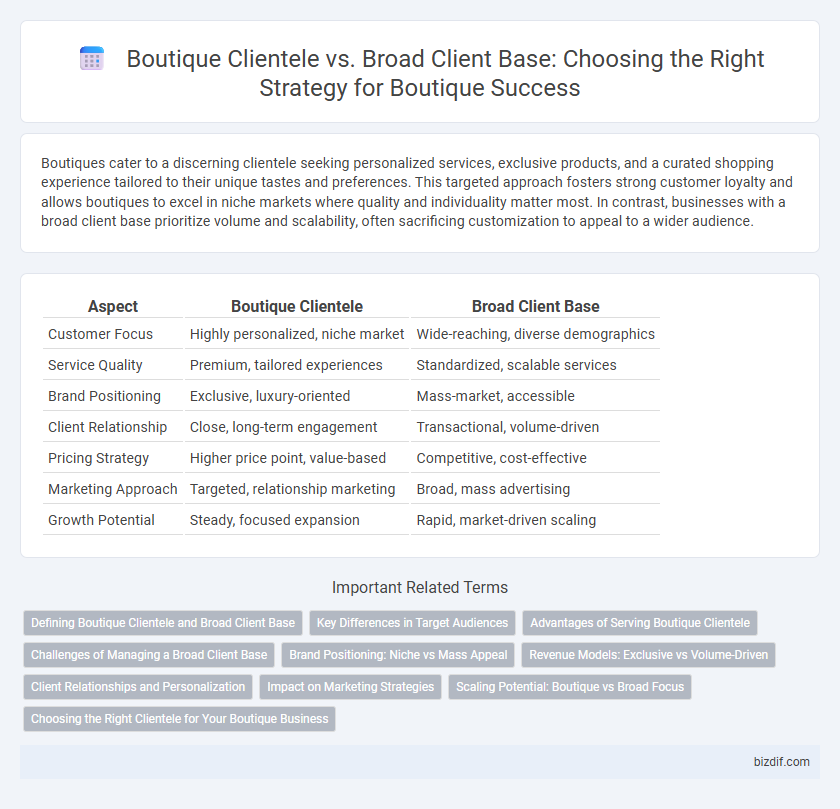Boutiques cater to a discerning clientele seeking personalized services, exclusive products, and a curated shopping experience tailored to their unique tastes and preferences. This targeted approach fosters strong customer loyalty and allows boutiques to excel in niche markets where quality and individuality matter most. In contrast, businesses with a broad client base prioritize volume and scalability, often sacrificing customization to appeal to a wider audience.
Table of Comparison
| Aspect | Boutique Clientele | Broad Client Base |
|---|---|---|
| Customer Focus | Highly personalized, niche market | Wide-reaching, diverse demographics |
| Service Quality | Premium, tailored experiences | Standardized, scalable services |
| Brand Positioning | Exclusive, luxury-oriented | Mass-market, accessible |
| Client Relationship | Close, long-term engagement | Transactional, volume-driven |
| Pricing Strategy | Higher price point, value-based | Competitive, cost-effective |
| Marketing Approach | Targeted, relationship marketing | Broad, mass advertising |
| Growth Potential | Steady, focused expansion | Rapid, market-driven scaling |
Defining Boutique Clientele and Broad Client Base
Boutique clientele consists of a select group of clients characterized by personalized service, niche preferences, and higher engagement levels, often tailored to exclusive products or services. In contrast, a broad client base encompasses a diverse and larger audience, prioritizing mass appeal and standardized offerings to attract a wide market segment. Defining boutique clientele emphasizes quality and specialization, while broad client base strategies focus on scale and accessibility.
Key Differences in Target Audiences
Boutique businesses target a niche clientele with specific preferences, emphasizing personalized service and tailored offerings, which contrasts sharply with broad client bases that cater to diverse customer needs through mass-market products. This focused approach allows boutiques to build deeper customer loyalty and create unique brand experiences, while broad client bases prioritize volume and wide accessibility. Understanding these key differences helps businesses align marketing strategies to either develop intimate customer relationships or maximize reach and sales.
Advantages of Serving Boutique Clientele
Serving a boutique clientele allows businesses to deliver highly personalized services tailored to the unique needs and preferences of each client, fostering stronger relationships and increased customer loyalty. Boutique firms can command premium pricing by offering specialized expertise and exclusive products that are not widely available. Concentrating on a smaller, targeted group enhances brand reputation through word-of-mouth referrals and cultivates a niche market presence, distinguishing the business from competitors with broad client bases.
Challenges of Managing a Broad Client Base
Managing a broad client base in a boutique setting presents challenges such as maintaining personalized service and meeting diverse customer expectations, which can dilute brand identity and strain resources. The complexity of addressing varied needs often leads to inefficiencies in communication and service delivery, risking customer satisfaction and loyalty. Boutique businesses must implement scalable systems and targeted marketing strategies to effectively balance growth with the intimate experience their niche clientele expects.
Brand Positioning: Niche vs Mass Appeal
Boutique brands strategically target a specific niche clientele, curating tailored experiences that foster deep customer loyalty and premium perception. In contrast, brands with a broad client base emphasize mass appeal through wide accessibility and standardized offerings, often prioritizing volume over exclusivity. This targeted versus generalized brand positioning significantly influences marketing strategies, product development, and overall customer engagement.
Revenue Models: Exclusive vs Volume-Driven
Boutique businesses typically rely on an exclusive clientele, emphasizing personalized services and premium pricing to maximize revenue per client. In contrast, broad client base models prioritize high volume sales, leveraging economies of scale to drive consistent revenue through lower pricing and mass appeal. Revenue models for boutiques center on differentiation and exclusivity, while volume-driven businesses focus on broad market penetration and customer acquisition.
Client Relationships and Personalization
Boutique businesses prioritize cultivating deep client relationships through personalized services tailored to individual preferences, enhancing customer loyalty and satisfaction. Their smaller, focused clientele allows for customized experiences and attention to detail, often resulting in higher retention rates compared to broad client bases. By contrast, businesses targeting a broad client base often rely on standardized offerings and scalable marketing strategies, which may limit opportunities for personalized interactions and long-term relationship building.
Impact on Marketing Strategies
Boutique businesses targeting a specific clientele benefit from highly personalized marketing strategies that emphasize niche interests, leading to stronger client loyalty and higher conversion rates. In contrast, a broad client base requires more generalized campaigns that prioritize brand awareness and mass appeal, often resulting in higher marketing costs and lower individual engagement. Tailoring marketing efforts based on client scope directly impacts campaign efficiency and overall return on investment.
Scaling Potential: Boutique vs Broad Focus
Boutique businesses typically serve a niche clientele, allowing for personalized services and strong brand loyalty but limiting rapid scaling due to a smaller target market. Broad-focused companies target a wider audience, enabling higher scaling potential through mass appeal and diversified customer segments. However, this approach may dilute brand exclusivity and require substantial marketing resources to maintain broad client engagement.
Choosing the Right Clientele for Your Boutique Business
Targeting boutique clientele allows businesses to offer personalized, high-quality products that cater to niche markets with specific preferences, enhancing customer loyalty and brand reputation. A broad client base emphasizes volume and mass appeal, which can dilute exclusivity and reduce profit margins per sale. Selecting the right clientele involves analyzing market demographics, purchasing behavior, and brand positioning to maximize profitability and customer satisfaction in the boutique sector.
Boutique Clientele vs Broad Client Base Infographic

 bizdif.com
bizdif.com